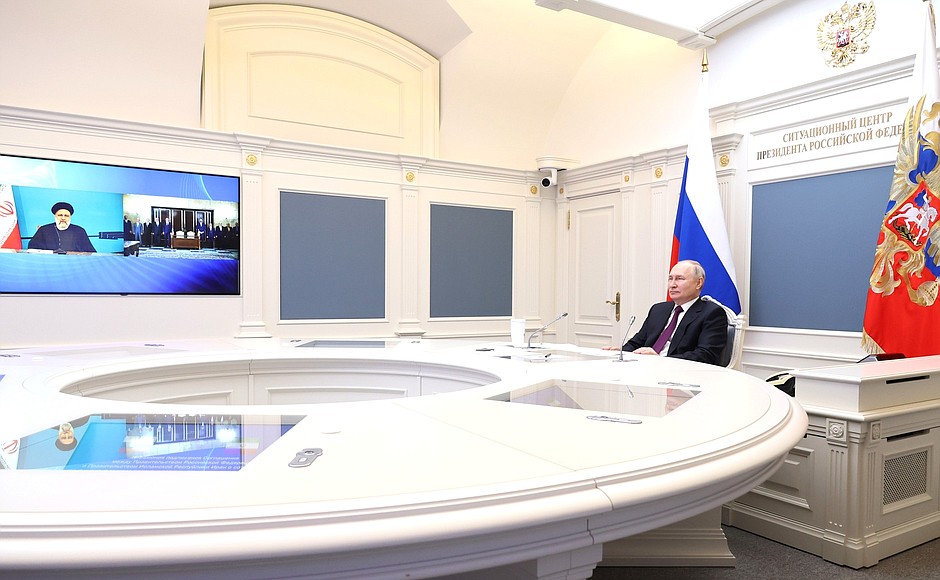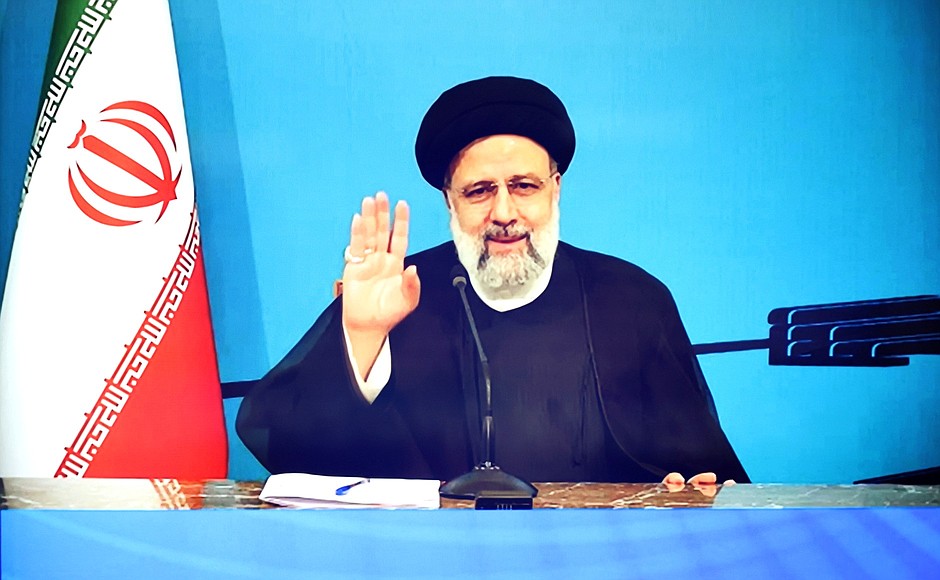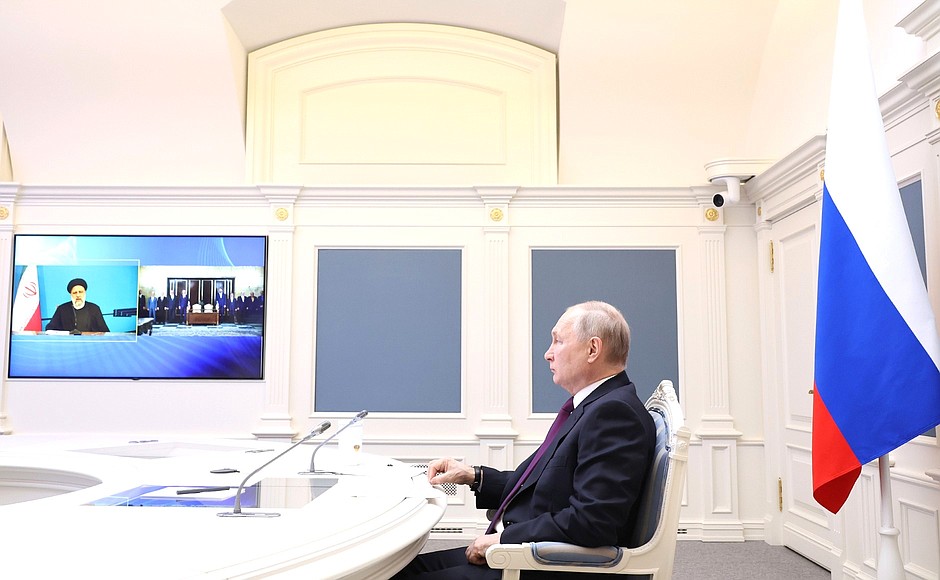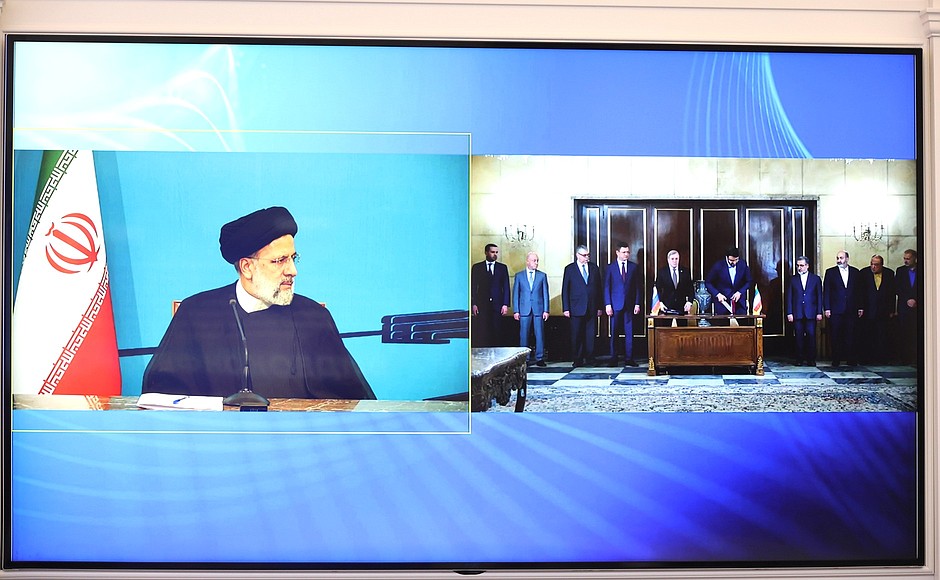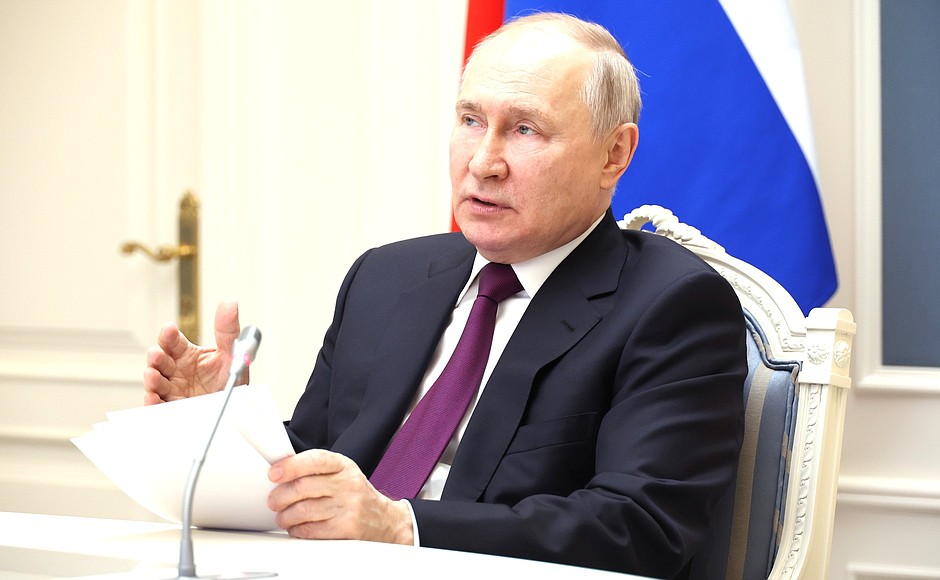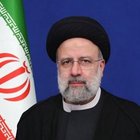President of the Islamic Republic of Iran Ebrahim Raisi (retranslated): Good afternoon. In the name of God, the Merciful, the Compassionate!
Mr President of Russia,
I would like to express my joy over the fact that Iran and Russia have finally reached an agreement on the construction of the Rasht-Astara railway line.
First of all, I must thank President of Russia Vladimir Putin, his colleagues in the Government of Russia, as well as the people of the Russian Federation. There is no doubt that this agreement is a major step towards expanding cooperation with the Russian Federation, both bilateral and multilateral.
Our two countries have made great strides in developing our cooperation in various areas. This includes our everyday efforts to expand transit links between our countries as part of the North-South project, as well as at a regional scale and internationally with all other countries taking part in the INSTC project.
Actually, I believe that all the countries and states in the region will benefit from this corridor. It will serve all countries involved in this project, including in its western and its eastern sections. In fact, this corridor serves as a symbol of friendship and embodies the multi-faceted nature of cooperation between our countries. This project will give a major impetus to expanding our cooperation across the board.
This project started two decades ago, in fact. However, the agreements had to be suspended due to certain objective reasons. Nevertheless, it is thanks to the unbending will demonstrated by the two countries’ leadership that we succeeded in reaching concrete understandings on this project that later translated into a specific agreement. Of course, transit links will expand across the region and all countries want this to happen.
I believe I am historically obliged to our people, and also as part of cooperation with our neighbours, to make full use of the potential our region offers by developing the infrastructure linking our two countries and enabling us to engage in a diverse mix of projects.
The Islamic Republic of Iran has great potential despite the efforts by the collective West to bypass the Iranian territories and use other transit routes.
We all understand, as the President of Russia has said on multiple occasions as a leader of a nation that is friendly to the Iranian people, and all other countries understand all too well that Iran offers the best transit routes through its territory and the most beneficial opportunities for delivering goods. There is hardly anyone who can question or overlook the advantages offered by Iran’s geopolitical location, which can bridge the gap that once existed. We offer a very reliable route, which holds a lot of promise, especially considering the involvement of our Russian colleagues who have joined this project in all respects.
Once again, I would like to emphasise that this project includes three sections. The Russian Federation, Kazakhstan, Turkmenistan and Iran form its eastern section. I must say that we have already made this route operational by working together. Several pilot deliveries have already been carried out.
The central section lies through the Caspian Sea. It has great potential. We must expand the capabilities of our ports. This effort is also underway and involves Russian companies.
The western section has yet to be built, and there is no railway to connect Rasht to Astara. By carrying out this agreement, we can bridge this gap so that we get three operating sections for transporting goods and promoting our projects.
My strong hope and real conviction is that after the implementation of this Agreement all interested parties will be aware that this route enables us to promote bilateral and multilateral cooperation. In fact, this is only one project, on which we have just been able to come to terms, but there are many similar projects.
There is also another project between Iran, Pakistan and Turkiye. We should build up the rail infrastructure between Iran and Iraq. All efforts are focused on this. Or take the route from Chabahar Port in the Persian Gulf to the Caspian Sea and further via the Russian Federation to Europe. These are the likely options for cooperation with such a big country as the Russian Federation. I think that all these projects will be in the trade and economic interests of our two countries. I am confident of this.
In fact, Mr President, we have great economic potential that is yet to be fully tapped. We must make every effort, use all our resources and possibilities to implement these projects.
I would like to thank you once again here for your highly serious approach to this matter, and [to thank] in particular your special aide for transit issues, who really works for the benefit of our nations. We are also grateful to him and would like this project to be implemented in full as soon as possible.
Mr President, thank you very much for making every effort to promote cooperation in this area; let me also thank your colleagues from the Russian Government.
Over to you, Mr President of Russia.
President of Russia Vladimir Putin: President Raisi, friends,
I warmly welcome all of you at the ceremony for signing a Russian-Iranian agreement that will launch the implementation of a truly large-scale project to build the International North-South Transport Corridor (INSTC).
We held many discussions on the importance of building this through railway line to connect Russian ports on the Baltic Sea and other northern seas to Iranian ports in the Persian Gulf and of the Indian Ocean. I would like to remind you that the pivotal decision on Russia-Iran cooperation in that sphere was adopted during the top-level talks held in Tehran in July 2022.
Today we are witnessing the beginning of the implementation of that idea, which was probably formulated for the first time 20 years ago. A 162-kilometre railway line will be built between the cities of Rasht and Astara in Iran. It may look like a short stretch, but its construction will allow us to create direct and uninterrupted railway transportation, which professionals describe as seamless, along the entire length of the North-South route.
Our successful cooperation within the framework of this ambitious project is evidence of the high standards and the fruitful and mutually beneficial nature of Russia-Iran relations. Both Russia and Iran are giving priority attention to the strengthening of trade, economic and other bilateral ties, which are based on the principles of neighbourliness, mutual respect and consideration for each other’s interests.
In this connection, I would like to thank you, President Raisi, and, of course, Supreme Leader Ayatollah Ali Khamenei for the constant attention to cooperation with our country. I would also like to use this occasion to convey our best regards to the spiritual leader of Iran.
I would like to emphasise that the unique North-South transport artery, due to include the Rasht-Astara railway line, will help considerably diversify global transport flows. Traffic via the new corridor will possess substantial competitive advantages. For example, it will take about 10 days to deliver consignments from St Petersburg to Mumbai. I would like to note, as a comparison, that it takes 30 to 45 days to deliver them using traditional commercial routes. In effect, this makes it possible to slash delivery deadlines and costs. Freight traffic volumes will soar noticeably, our two states will consolidate their transit potential, Russian and Iranian goods will obtain more convenient and diverse access to external markets, in terms of specific routes.
I would like to note that there are plans to use the new route for delivering foodstuffs and other agro-industrial produce to consumers in Iran, Persian Gulf and African countries. Consequently, this transport corridor will make a tangible practical contribution to facilitating global food security.
This will also result in obvious economic benefits for Russia and Iran. Income, derived from freight deliveries via the North-South corridor, as well as the more intensive operation of our states’ ports, will help establish related businesses and facilitate their growth. It will be necessary to develop major logistics and production clusters.
This means that jobs will be created, and the investment climate in Russian and Iranian regions (through which the new transport routes will run) will improve.
The implementation of the Rasht-Astara project is only the beginning (I agree with the President of Iran completely here) of our work to methodically expand the capacity of railway routes of the North-South transport corridor. Mr Raisi has just noted possible routes that have already started operating and that will continue to develop.
Our interaction in the context of establishing this corridor that we are discussing today is taking place in close partnership with Azerbaijan. We are expecting that a cooperation agreement on expanding the railway infrastructure and freight traffic via the North-South route will be finalised in a trilateral format involving the Azerbaijani side as soon as possible. This will make it possible to create the required legal framework for successfully coordinating the actions of our three countries in the future.
I would certainly like to thank all Russian and Iranian colleagues who, in a short period of time, have managed to reach agreement on all the key issues, including the provision of funding, specific terms for supplying goods and services, and regulations for operating the future Rasht-Astara railway. I would also like to express confidence that construction of this highly strategic section of the North-South route will proceed in the same well-coordinated and effective manner. I have no doubts on this issue.
Thank you very much for your attention. Thank you.
(A ceremony for signing the agreement.)
Ebrahim Raisi (retranslated): I would like to say that the Iranian Ambassador to Russia, who will be working in Moscow, Mr Jalali, will pay close attention to this project with the assistance of his Russian colleagues. I would like this project to materialise as quickly as possible. Mr [Deputy Prime Minister Alexander] Novak follows a hands-on approach, and I hope that he makes sure that this is also the case for this project.
Vladimir Putin: Mr President, thank you so much for contributing to this project in person. This is indeed a major endeavour for the region, for global transport infrastructure as a whole, and for our countries too. Thank you for your support.
I was very happy to see you and hope that we will maintain our contacts, both remotely and face-to-face.
All the best to you, and until next time. Thank you very much. Once again, my congratulations to everyone.
